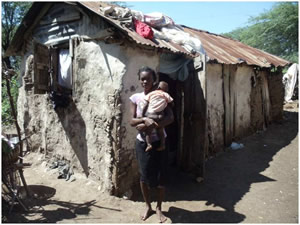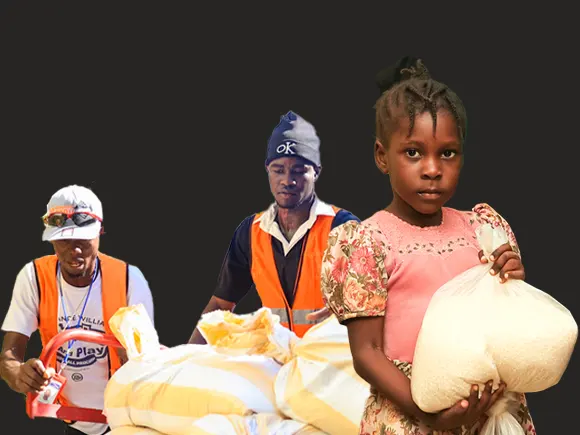Food For The Poor Receives Grant to Build a Village in Haiti
Untitled Document
 | |
Food For The Poor has received a grant from the W.K. Kellogg Foundation to build a village of 50 homes in Fond des Blancs, Haiti. Many families there are living in dirt-floor houses. | |
Related Item: | |
COCONUT CREEK, Fla. (May 30, 2014) – Food For The Poor has received a grant from the W.K. Kellogg Foundation to build a village in Fond des Blancs, Haiti. Located in the Aquin district within the country’s peninsula, it is a dry mountainous region with a population of approximately 30,000 people.
Many of the families who call Fond des Blancs home are living in dirt-floor houses that have crumbling mud walls, no sanitation and rusted zinc roofs that leak. During the rainy season, many of these mud-based structures simply collapse from the weight of the water, making these makeshift dwellings very dangerous for the occupants.
“The goal of this grant is to address the overwhelming need for housing, sanitation and income-producing projects for the people within the community,” said Angel Aloma, Executive Director of Food For The Poor. “With the support of the Kellogg Foundation, Food For The Poor soon will begin the construction of 50 concrete block homes for families who are in desperate need of housing.”
The W.K. Kellogg Foundation, founded in 1930 as an independent, private foundation by breakfast cereal pioneer Will Keith Kellogg, is among the largest philanthropic foundations in the United States. The foundation also works with international organizations that are committed to improving the lives of the materially poor with self-sustaining opportunities.
“This is an integrated project that incorporates income-generating activities and the provision of decent homes for families in Fond des Blancs. It is an opportunity to learn and to explore how to enable communities to build safe living environments for families,” said Alix Cantave, Program Officer for Latin America and the Caribbean for the W.K. Kellogg Foundation. “It is also an exercise in community collaboration, since Food For The Poor is collaborating with two organizations in the community.”
Food For The Poor will be working with in-country partners from the St. Boniface Haiti Foundation, a Massachusetts-based organization with a 31-year history in Fond des Blancs. Each of the 50 homes built in the St. Boniface Community Village will have solar lighting, a cistern for water, and an indoor toilet with a dual-chamber sanitation system.
With the potential risk of cholera ever present, hygiene and sanitation classes will be provided for the residents living in the village, along with vocational and animal husbandry training. The animal husbandry projects will include 52 goats and 600 layer hens, along with shade covering and cages for the livestock. Feed, medicines and supplies will be provided for the health of these animals, which will become a source of food and income-generating assets.
Haiti imports 17 million eggs per month from the Dominican Republic. Local egg production can provide a substantial income for residents of the St. Boniface Community Village, who can sell their eggs for profit. Fond des Blancs also has very fertile soil. With the proper tools and agricultural training, the farmers can better cultivate their main crops of corn, millet, banana, avocado, bean, yam, orange and manioc.
The hope of the grant is that this new village in Fond des Blancs will provide families with the income needed to pay the tuition fees of their children. It is also the hope that opportunities for an advanced level of education will soon become available, so the town’s young people will want to stay in the region and not move to Port-au-Prince in search of better opportunities.
Food For The Poor, named by The Chronicle of Philanthropy as the largest international relief and development organization in the nation, does much more than feed millions of the hungry poor in 17 countries of the Caribbean and Latin America. This interdenominational Christian ministry provides emergency relief assistance, clean water, medicines, educational materials, homes, support for orphans and the aged, skills training and micro-enterprise development assistance, with more than 95 percent of all donations going directly to programs that help the poor. For more information, please visit www.FoodForThePoor.org.
Wanda Wright
Food For The Poor
Public Relations Associate
954-427-2222 x 6079
wandaw@foodforthepoor.com
